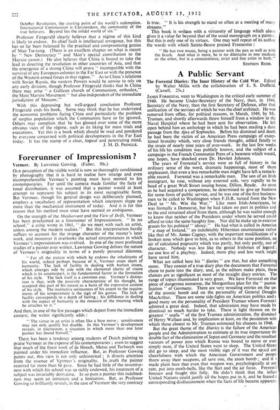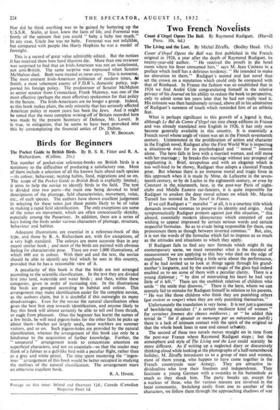A Public Servant
The Forrestal Diaries: The Inner History of the Cold War. Edited by Walter Millis with the collaboration of E. S. Duffield. (Cassell. 25s.) JAMES FORRESTAL went to Washington in the critical early summer of 1940. He became Under-Secretary of the Navy, then, in 1944, Secretary of the Navy, then the first Secretary of Defence, after that unification of the services of which he was the chief architect. He was removed from office, for political reasons, in March, 1949, by Mr. Truman, and shortly afterwards threw himself from a window in the Naval Hospital where he had been sent for observation. He left open behind him an anthology in which he had been reading a dark passage from the Ajax of Sophocles. Before his dismissal and death he had been the victim of an American Press campaign of excep- tional brutality which, very close friends thought, added fatally to the strain of nearly nine years of over-work. In the last few weeks of his life his condition was publicly known, and the subject of a campaign in the French Communist Press of a baseness which would, one hopes, have shocked even Dr. Hewlett Johnson.
The years of Forrestal's service were so full of history in the ordinary sense of the word, dramatic happenings, most of them unpleasant, that even a less remarkable man might have left a remark- able record. Forrestal was a remarkable man. The son of an Irish immigrant, he rose, without any external aids, very rapidly to be head of a great Wall Street issuing house, Dillon, Reade. As soon as he had acquired a competence, he determined to give up business for some form of public service, and he was one of the first business- men to be called to Washington when F.D.R. turned from the New Deal to "Mr. Win the War." Like most Irish-Americans, he was formally a Democrat, but he had taken no part in politics and to the end remained aloof from them, although he was realist enough to know that neither of the Presidents under whom he served could afford to take the same haughty line. Nor did he make up in exterior graces for his political" idiocy." He had what is called in America, "a map of Ireland," an indubitably Hibernian countenance rather like that of Mr. James Cagney, with the important modification of a broken nose which gave to him, as to others in the same position, an air of calculated pugnacity which was partly, but only partly, out of character. Nobody was less like the genial Irishman of legend ; no one less of a playboy. Indeed, more play and less work might have saved him.
What are called here his " diaries " are that, but also something more. They consist of a true diary plus the documents that Forrestal chose to paste into the diary, and, as the editors make plain, these choices are as significant as most of the straight diary entries. The range of topics illuminated is very great. We have Forrestal on that piece of dangerous nonsense, the Morgenthau plan for the" pastor. lisation " of Germany. There are very' revealing entries on the us; of the atomic bomb and on the personality of General Douglas MacArthur. There are some side-lights on American politics and a good many on the personality of President Truman whom Forrest' admired a great deal. Indeed, that admiration may have made 171S dismissal so much harder to take. There is light thrown on tie greatest" snafu " of the first Truman administration, the dismissil of Henry Wallace and, by implication at least, on the pessimism win which those closest to Mr. Truman estimated his chances in 1948.
But the great theme of the Diaries is the failure of the Americai people and the Administration to estimate at its true importance de double fact of the elimination of Japan and Germany and the resultait vacuum of power into which Russia was bound to move or even simply ooze, if the United States went to sleep. The United Statss did go to sleep, and the most visible sign of it was the speed and cheerfulness with which the American Government and peope threw away their weapons, all save one, the atom bomb ; and it s made plain here that even that weapon was, psychologically at any rate, put into .moth-balls, like the fleet and the air force. Forrestd foresaw and fought this folly. He didn't think that the infant United Nations could justify all the hopes put in it, and he feared a corresponding disillusionment when the facts of life became apparent. Nor did he think anything was to be gained by buttering up the U.S.S.R. Stalin, at least, knew the facts of life, and Forrestal was firmly of the opinion that you could 'baby a baby too much." In any case, Uncle Joe was no baby. Forrestal was not infallible, but compared with people like Harry Hopkins he was a model of foresight.
This is a record of great value admirably edited. But the notices it has received show how hard illusions die. More than one reviewer was surprised to find that an Irish-American was not an isolationist, not anti-British. The same surprise was expressed when Senator McMahon died. Both were treated as rarae ayes. This is nonsense. The most eminent Irish-American politician of modern times, Ail Smith, a most vehement enemy of F.D.R's. domestic policy, sup- ported his foreign policy. The predecessor of Senator McMahon as senior senator from Connecticut, Frank Maloney, was one of the most effective (perhaps the most effective) spokesmen for that policy in the Senate. The Irish-Americans are no longer a group. Indeed, as this book makes plain, the only minority that has seriously affected American policy in recent years has been the Jews. And it might be noted that the most complete writing-off of Britain recorded here was made by the present Secretary of Defence, Mr. Lovett. It is true, in mitigation, that he seems to have been provoked into this by contemplating the financial antics of Dr. Dalton. D. W. BROGAN.



























 Previous page
Previous page